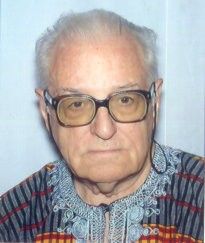Daniel Comboni
Comboni Missionaries
Institutional area
Other links
Newsletter
In Pace Christi
De Bertolis Giacomo Francesco
Fr. Francesco Giacomo De Bertolis was born at San Martino di Castrozza on 1 October, 1927. He entered the Comboni Institute at Muralta (Trent), in 1938, joining the first gymnasium year, perhaps due to the “prayers” of his aunt, Sister Giusta Scalet, a Comboni Sister. From 1941 to 1943 he stayed at Brescia and in August of 1943 entered the novitiate in Florence where he took first vows on 15 August, 1945. He did the course in philosophy at the Rebbio Scholasticate and that of theology in Rome. On 22 September, 1950, he took perpetual vows in Venegono and was ordained priest in Rome on 24 March, 1951.
The following September he was sent to Zahle, in Lebanon, to study Arabic. Assigned to the Province of Khartoum, he reached his destination in 1952 and from then on he always worked in North Sudan, except for a period of four years (1976-1980) in Rome.
He went to Khartoum as a teacher at Comboni College. In 1953 he became superior of the community, in 1963 vice-superior and bursar and in 1967, superior, director and regional councillor. From 1970 to 1975 he was parish priest of the Cathedral.
In 1976 he was called to the Rome Generalate where he stayed for four years as superior and formator of scholastics.
On 1 September, 1980, he was again assigned to Khartoum where he continued with his teaching; the following year he was elected Provincial Superior for the period 1981-1984.
Throughout this time, despite suspicions and restrictions on the part of the Islamic government, the educational, health and social institutions of the Church were enjoying ever greater moral authority, while the Christian community was growing numerically. The armed conflict between South Sudan and the government of Khartoum rendered missionary work more difficult and delicate; it brought about an influx of many displaced people, many of whom were Catholics, who fled from the South and sought refuge in the areas around Khartoum, Kosti, El Obeid and other cities of the North in areas where heretofore Christians were unknown. The Church welcomed them, helped them, instructed them and evangelised them.
It was in this context that Fr. Francesco arrived at Damazin, on the Blue Nile and 500 Km from Khartoum. He had as his helpers two young diocesan priests. The mission took care of eighteen prayer centres: the closest were 10 Km away and the furthest were 180 km away. A few years later he succeeded in having the Egyptian Sisters of the Sacred Heart come to the parish. They were of great help in the pastoral work, especially since they knew Arabic “better than any of the missionaries”.
However, the request of Fr. Fancesco to build a church in the city remained unanswered by the authorities.
Fr. Francesco was ordered by the government authorities to leave Damazin and went to the Provincial House in Khartoum North, and then to the Centre of Kobar, engaged in teaching. From 1993 to 1998, he was formator of Postulant Students at the Postulancy of Khartoum North.
He then spent seven years in the parish of Kosti, engaged in ministry, as provincial secretary for evangelisation and local superior. After two years in Comboni College, he was given the task of rearranging and classifying the provincial archives.
During his final months, Fr. Francesco went to Verona for treatment. In a letter to a Sudanese confrere, Fr. Yousif William Idris El Tom, he wrote: “I am aware that I am ill and that there is no hope of returning to Sudan, but God is greater than Sudan. I wish to continue to prepare the text of the history of the Comboni Missionaries in the Province of Khartoum; a text that may be of benefit to new missionaries who come to the Province and to the youth in formation”.
A full-time formator up to his last days, Fr. Francesco, as Fr. Giovanni Taneburgo said in his homily at the funeral, “did not invest so much in material structures but put all his energy into the human and spiritual growth of people. Well he knew that when we invest in people, we never lose”. Fr. Francesco died in Verona on 1 March, 2012.

